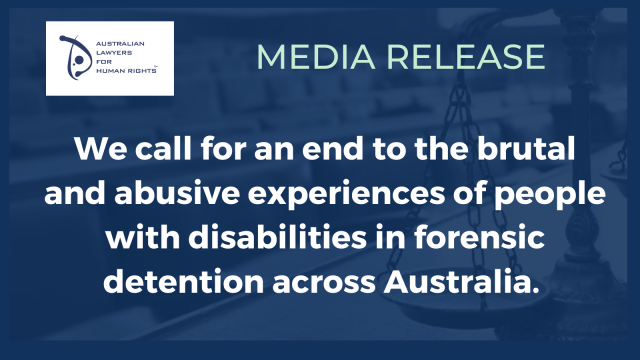Leading human rights lawyers and disability justice experts call for end to indefinite detention laws

Leading human rights lawyers and disability justice experts are calling for an immediate end to indefinite detention laws in Australia that often see people with disabilities abused and victimised, their behaviour criminalised and often becoming victims of the criminal justice system rather than being managed through disability support services.
The call follows the recent episode of Four Corners, Trapped, which revealed claims of torture and mistreatment of people living with disabilities and mental illness who are locked up indefinitely by the state.
According to reports, around Australia, some 700 people who have been charged, but not convicted, of crimes are being detained in the forensic system.
Professor Emerita Eileen Baldry AO, UNSW said, “Hearing of the brutal and abusive experiences directly from people with psychosocial and cognitive disabilities in forensic detention reveals the tortuous and illegal use of solitary confinement and indefinite detention across Australia. Their stories highlight what decades of research tells us: people with disability are significantly more likely than others to be abused and victimised, their behaviour criminalised and to be managed by police, courts and prisons rather than disability support services.”
Taylor Budin, Lived Experience Disability Advocate, Intellectual Disability Rights Service experienced cruel, degrading and inhumane treatment while incarcerated in an Australian prison. Ms Budin says “while I was in detention, I was humiliated on a daily basis which caused me great suffering.” Ms Budin stressed, “people with disabilities who are indefinitely detained are suffering great harm. They often do not know why they are in detention and do not know when they will be released. Whilst they are detained, they are subject to restrictive practices, including psychotropic medication that leaves them like a zombie. It is important that indefinite detention and cruel degrading and inhuman treatment stops happening to people with disabilities when they are detained.”
Patrick McGee, Founder of Australians for Disability and Justice was a co-guardian for an Aboriginal man detained under indefinite detention laws in the Northern Territory for 15 years. Mr McGee describes the treatment he faced in detention as an “abhorrent violation of the man’s human rights”. Mr McGee explained, “Indefinite detention laws which see people with intellectual disabilities and disproportionately impact Aboriginal and Torres Strait Islander peoples, without an end date to their detention, must be repealed immediately.” “Often people with intellectual disabilities who are incarcerated or detained in forensic disability units are held there due to an absence of appropriate housing or disability services and funding that would facilitate their release. Immediate action must be taken by governments to repeal these laws and offer appropriate human-rights focussed solutions to the release of all people indefinitely detained.”
Natalie Wade, Chair of Disability Rights, Australian Lawyers for Human Rights (ALHR) explained, “The indefinite detention of people with disabilities breaches many of Australia’s international legal obligations. The UN Convention on the Rights of Persons with Disabilities (CRPD) makes clear that the existence of a disability in no case justifies a deprivation of liberty. Indefinite detention and the detention conditions exposed by Four Corners violate Australia’s nonderogable obligations under the Convention Against Torture.” Ms Wade continued, “In 2014 both the Australian Law Reform Commission and Australian Human Rights Commission highlighted their concerns and recommended law reform be undertaken. Those recommendations remain shelved. In 2019, the CRPD Committee urged Australia to stop using indefinite terms that exceed criminal convictions against people with disability. Most recently, the Disability Royal Commission has called for reforms.
We call on all States and Territories to repeal these laws immediately.
We further call on Australia to take urgent action to reverse its failure to implement the Optional Protocol to the Convention Against Torture (OPCAT) and ensure transparent, independent oversight of places of detention throughout Australia”.
Contact: Michael Salmon, ALHR media manager: 0417 495 018



